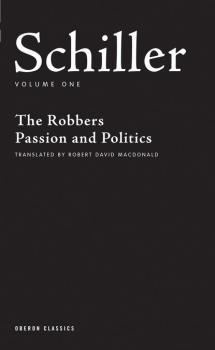Friedrich Schiller
Список книг автора Friedrich SchillerSchiller: Volume Three
Includes the plays Joan of Arc and William TellTwo plays about historical characters whose fame has also raised them to the level of myth. In Joan of Arc (1801), Schiller allows his heroine a more glorious death than her historical execution at the stake, and imbues her with more passion, and compassion, than is usually ascribed to the actual Joan.In William Tell (1805), often regarded as his greatest play, Schiller creates a vivid sense of time and place – medieval Switzerland – and in his troubled hero, the accidental revolutionary Tell, create a complex and fascinating figure.One of the great figures in German literature, Friedrich Schiller (1759-1805) was in some ways the most significant playwright of his day, numbering among his devotees Coleridge and Carlyle. His plays are known for their originality of form, vivid stage imagery and powerful language, faithfully rendered in Robert David MacDonald's acclaimed translations
Schiller: Volume One
Includes the plays The Robbers and Passion and PoliticsTwo plays concerned with tyranny and freedom. Schiller's first play, The Robbers (1781), was written in great secrecy under the prison like conditions of Württenberg's Karlsschule: Karl, the son of a count, is disinherited through the machinations of his brother Franz, and, turning his back on a social order he finds unjust and corrupt, becomes the leader of a band of robbers. In Passion and Politics (1784), a 'bourgeoise tragedy', the love between Louise, a musician's daughter, and Ferdinand, a politician's son, crosses an unbridgeable social divide.One of the great figures in German literature, Friedrich Schiller (1759-1805) was one of the most significant playwrights of his day, numbering among his devotees Coleridge and Carlyle. His plays are known for their originality of form, vivid stage imagery and powerful language, faithfully rendered in Robert David MacDonald's acclaimed translations.
Mary Stuart
Two queens. One in power. One in prison. It’s all in the execution. Schiller’s political tragedy takes us behind the scenes of British history’s most famous rivalry.
Mary Stuart/Joan of Arc
These two tragedies, written at the peak of Schiller’s career as a dramatist, contain his most telling, and touching, portrayals of women. His heroines are propelled, by birth or a sense of divine mission, into exalted political positions, where their qualities as human beings, and particularly as women, are put to the severest tests, from which they emerge triumphant, but doomed. Schiller’s breadth of sentiment, combined with his consummate stagecraft, and Shakespearean mastery of verse and nobility of language, ensure his position as Germany’s greatest dramatist, and these translations, prepared for, and performed by Glasgow’s famous Citizens Company, should go far to ensure his long overdue acceptance in Britain as a master of the European Theatre.
The Robbers
The Robbers (1781) was written in great secrecy under the prison-like conditions of Wurttenberg's Karlsschule: Karl, the son of a count, is disinherited through the machinations of his brother Franz, and, turning his back on a social order he finds unjust and corrupt, becomes the leader of a band of robbers.
The Collected Works of Friedrich Schiller
This comprehensive eBook presents the complete works or all the significant works – the Œuvre – of this famous and brilliant writer in one ebook – 8466 pages easy-to-read and easy-to-navigate: • Aesthetical Essays of Friedrich Schiller • Mary Stuart: A Tragedy • The Robbers • Wilhelm Tell • Don Carlos: A Play • Love and Intrigue: A Tragedy • The Poems of Schiller – Third period • The Thirty Years War – Complete • Wilhelm Tell • The Maid of Orleans: A Tragedy • The Works of Frederick Schiller • The Death of Wallenstein • Philosophical Letters of • The Ghost-Seer; or the Apparitionist; and Sport of Destiny • History of the Revolt of the Netherlands – Complete • The Bride of Messina, and On the Use of the Chorus in Tragedy • Turandot: The Chinese Sphinx • The Piccolomini: A Play • Wallenstein's Camp: A Play • Biographical EssaysThomas De Quincey • The History of the Thirty Years' War • Fiesco; or, the Genoese Conspiracy: A Tragedy • The Poems of Schiller – First period • The Poems of Schiller – Second period • The Poems of Schiller – Suppressed poems • Adolphe: Anecdote trouvée dans les papiers d'un inconnu (Französisch)Benjamin Constant • The Illustrated Works Of • Demetrius: A Play • The Thirty Years War • The Life and Works of Calvin Thomas • Wallenstein • Thirty Years War: Book I. Book II. Book III. Book IV. Book V. Revolt of Netherlands: Book I. Book II. Book III. Book IV. • The Robbers Fiesco Love and Intrigue • The Camp of Wallenstein Piccolomini • The Death of Wallenstein Whilhelm Tell • Don Carlos Demetrius Mary Stuart • The Maid of Orleans The Bride of Messina • PHILOSOPHY: Aesthetical Essays Philosophical Letters • NOVEL:The Ghost Seer or, The Apparitionist and The Sport of Destiny • etc.









